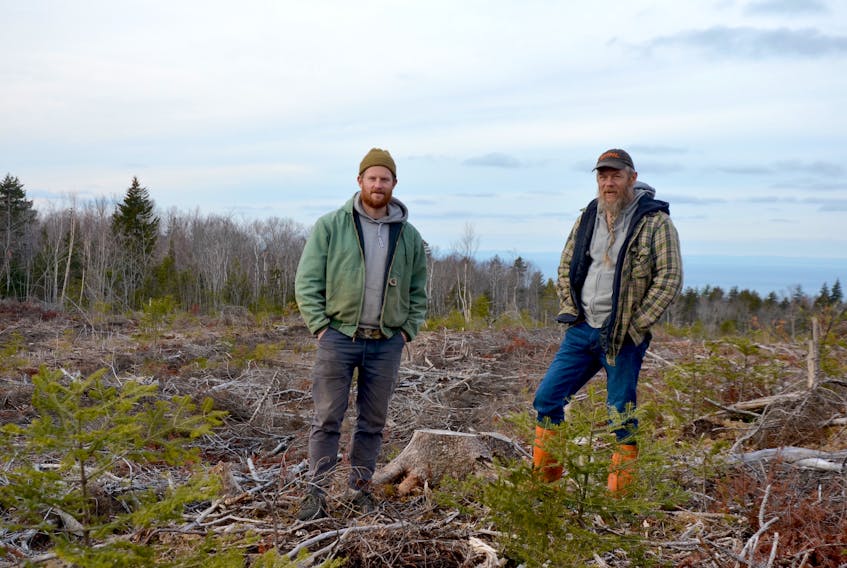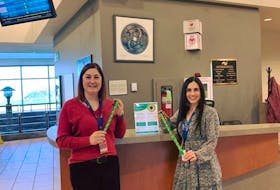HAMPTON, N.S. — Deryk Eagles walks the clear-cut, his bright orange Dunlops the only bit of unnatural colour on the 86 acres of slash. He steps carefully over limbs left from the ‘harvest’ to a pile of small logs culled from the mess. They’ll be firewood back at Snow Lake Keep.
His partner, Adam Harris, stands with hands in pocket, atop the stump of a big old spruce in the recent clear-cut at the top of Hampton Mountain Road. It upsets Harris that he can now walk through a clear-cut forest without getting angry -- as if it was normal. He knows he should be mad.
It’s more like he’s resigned. But that doesn’t mean he and Eagles aren’t doing something about it. They bought the clear-cut land and they’re going to rehabilitate it and provide young people with opportunity at the same time.
“The value of that land is first in the cultural and community value of it,” said Harris. “It’s a way of attracting more folks to this area who are of a certain mindset, and those people would be interested in working with that land. Help it recover and understand that’s what’s required. I think that’s the first thing. And secondly, it’s of value because as that recovery is managed there’s a lot of firewood that comes out of that, out of the thinning.”
But there’s more to it than that.
“I think also just like a bit more of a stronghold here that’s inherently anti-clear-cutting,” he said, “because every person who has ever gone through the recovery process is someone who will absolutely understand why you should never clear-cut in the first place. The amount of work that goes into a recovery, and everyone you interact with and is involved in that process over those years, is really strengthening the understanding in the community as to what sustainable forestry would actually look like.”

THRIVING
He’s sitting in the kitchen of their home at the Keep a few kilometres away. It’s all big wood beams. Wood and stone everywhere. French press coffee on the big wood range. Coffee cups on the big wood table. The old hippie communes from the 1970s are nearby.
The house sits in an old clear-cut Eagles bought 15 years ago. Outside tall, thin hardwoods are already creating an overstory. Thinning the trees – four or five times already -- supplies them, and the other homeowners on the property, with plenty of fire wood, and to make it a true, multi-species, multi-age forest they’re planting or protecting new trees. There are vegetable gardens everywhere, a goat house, solar arrays. A duck pen. There’s even a cheese cave. Snow Lake Keep is a thriving off-the-grid community built right into a recovering forest.
The new property could become that. They’ve already identified some good spots to build homesteads there. People are already interested -- the new homesteaders who understand the dividends they receive have nothing to do with stock portfolios but with what nature can offer sustainably if you put in the hard work on her behalf.
NOT ABANDONED
“I think even the most ecologically blind among us would be impacted to some extent by seeing that people really do care about these places,” Harris said. “That these clear-cuts aren’t just sort of abandoned places. That they’re places where people want to live and see thrive and that their livelihoods in those places are intimately dependent on the health of the forest around them as it recovers.”
He believes a huge part of people’s mentalities when they clear-cut something is that they see no value beyond the standing trees that they’re cutting down.
“And really no further thought put into it. The cultural implications of that. The community implications, and the ecological – obviously – implications of that for human beings,” Harris said. “I don’t think it’s easy to get them to care about non-human interests, of which of course there’s many in a forest that’s destroyed. Seeing a young family trying to establish themselves in what was once a forest? I think it would be food for thought for the most ecologically blind.”

BEST SHOT
Eagles talks about the climax forest – red spruce, white pine, eastern hemlock, sugar maples, yellow birches. That’s the forest at equilibrium -- in regards to species composition -- for as long as the forest remains undisturbed.
“Ultimately it’s still, by a long shot, the best technology we have for sequestering carbon,” he said. “And that is the most important thing we can do on this planet right now.”
Forests take ages to grow back and the climate crisis is immediate. Eagles understands the time pressure. “It’s our only shot,” he says of reforestation.
Harris said there’s something beautiful about taking problems and finding that together they’re the solution. Fixing the forests fixes a lot.
“We’ve got young people who are in need of affordable housing and places where they can grow food,” he said. “We have this huge and growing stock of clear-cut land that’s mostly valueless to most people. And this sort of, like, youth drain that’s happened on the east coast. All of these things could be sorted out if we attract these young people, looking for places to farm in an affordable way, to these cuts. And simultaneously these clear-cuts will have the sort of human presence required to coach them back to health.”
CULTURAL GENOCIDE?
“In the last 20 years we’ve, in Nova Scotia, experienced basically a rural, cultural genocide,” said Eagles who sees a built-in economic viability that in the end could sustain the new homesteaders and the fledgling forest as they grow back. “All of the young people left. Now all the old people are dying. So the culture indigenous to this place is (gone).”
Harris sees that disappearing rural culture as a side effect of corporate greed.
“One-hundred people with absolutely no effort being applied, other than the fact they happen to have enough money to spare in the first place, sort of waiting for a freebee,” Harris said of stock holders in big corporate resource companies. “That’s where a lot of those ill behaviours originate is that they’re trying to extract a level of value that’s well, well, well beyond the amount of effort that’s actually being put in. That’s always going to come back to bite you. Which means they’re always going to be extracting more value than they’re returning to the community just by definition.”
ANTITHESIS
The antithesis of that is what Eagles and Harris are trying to do. Communities have to become involved.
“That’s what we’re trying to foster here,” Eagles said. “A community that will be proactive. There’s all kinds of people who work in forestry in our neighbourhood. A lot of them operate machines for clear-cut. They’re our friends. It’s their jobs. That’s just the job they’ve gotten into working in forestry their whole life.”
He doesn’t blame or judge.
“There’s really not a whole lot of alternatives,” Eagles said. “If we had a government that was open to, say, community forestry projects, we could securely take on a block of Crown land and rehabilitate it with some funding in order to meet our targets in Paris, or where ever, that our government made and has to fulfill. That is proactive.”
He said it also allows people to actually have a part in the process.
“A place where they feel like they can do something. That’s one of the biggest issues. Everyone knows what kind of trouble we’re in but everybody feels powerless to do something about it,” he said. “This is the ultimate win-win. The government wins. They get to meet their targets. The people get a purpose that they feel good about. It fosters a community spirit. The environment is improving. And we’re also building a forest inventory that hopefully in the future can be more sustainably managed by our kids and grandkids. It’s a long-term strategy and I don’t see how anybody can lose.”
PRESSURE
Both Eagles and Harris say young people across Canada are looking to Nova Scotia for this particular opportunity. Land prices almost everywhere else are prohibitive. People reach out to them.
The name Spider Robinson comes up. His book ‘Time Pressure’ takes place not too far away. The famous science fiction writer was among the many Americans who came to the area almost 50 years ago. Back-to-the-landers. Some avoiding the draft. Some avoiding turbulent times.
Both Harris and Eagles understand the similarities. Nova Scotia being a Mecca for a certain type of people.
The difference, they say, is that in the 1970s people were running from something. Today they’re running towards something.









